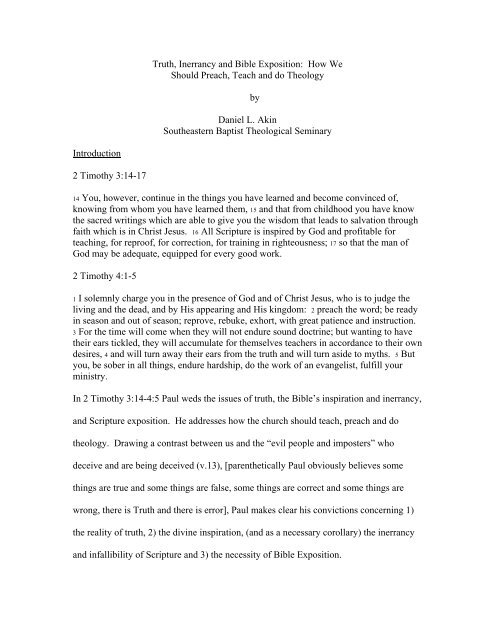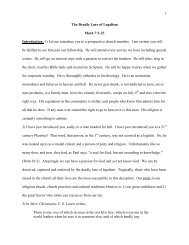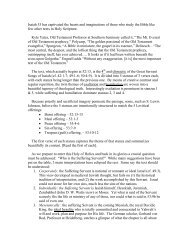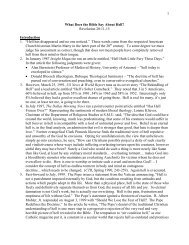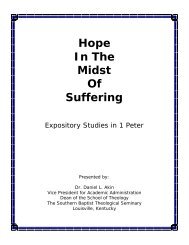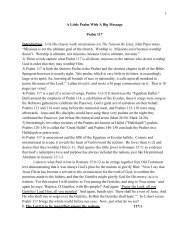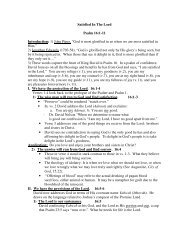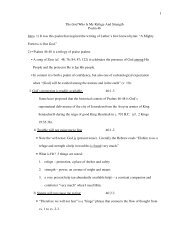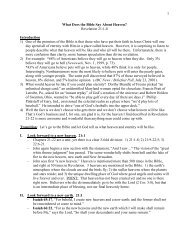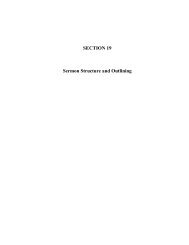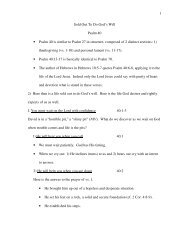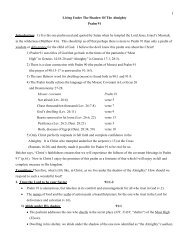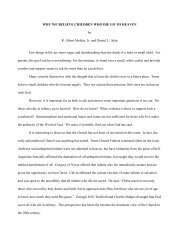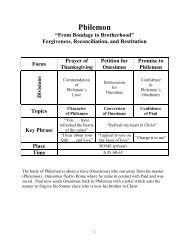Truth, Inerrancy and Bible Exposition: How We Should ... - Daniel Akin
Truth, Inerrancy and Bible Exposition: How We Should ... - Daniel Akin
Truth, Inerrancy and Bible Exposition: How We Should ... - Daniel Akin
You also want an ePaper? Increase the reach of your titles
YUMPU automatically turns print PDFs into web optimized ePapers that Google loves.
5“limited inerrancy or functional inerrancy,” though he did not reveal any familiarity withthe terms.1) Limited <strong>Inerrancy</strong>:Affirms the <strong>Bible</strong> is inerrant in all matters of faith <strong>and</strong> practice, as well as matterswhich can be empirically verified.Inspiration does not grant modern underst<strong>and</strong>ing; hence the <strong>Bible</strong> may containerrors of science or history, but it did secure fully truthful teaching about belief<strong>and</strong> behavior. I.H. Marshall perhaps would represent this view.2) Functional <strong>Inerrancy</strong> (or Infallibility of purpose):Affirms that the purpose of the <strong>Bible</strong> is to bring people to salvation <strong>and</strong> growth ingrace. The <strong>Bible</strong> accomplishes its PURPOSE without fail.Affirms that the <strong>Bible</strong> is sufficiently accurate in factual matters to accomplish itsPURPOSE, but seeks to avoid describing the inerrancy of Scripture primarily interms of FACTICITY. Instead, it speaks of the <strong>Bible</strong> in terms of trustworthiness<strong>and</strong> faithfulness. (Jack Rogers, Donald McKim).My Professor did not offer as an option the view represented in the Chicago Statement on<strong>Inerrancy</strong>, what some have called “Critical or Natural <strong>Inerrancy</strong>.” This view, assummarized by David Dockery:• Makes cautious use of critical methodologies such as form <strong>and</strong> redactioncriticism.• Affirms the truth of everything in the <strong>Bible</strong> to the degree of precision intended bythe authors.• Usually regards biblical references to scientific matters as phenomenal (how theyappeared to the writer).• Does not seek to harmonize every detail of Scripture because it recognizes thatthe author wrote for different purposes.Going to the Chicago Statement itself we find the following reasoning concerning thisposition. From the Short Statement:
7Article XI“<strong>We</strong> affirm that Scripture, having been given by divine inspiration, is infallible,so that, far from misleading us, it is true <strong>and</strong> reliable in all the matters itaddresses.<strong>We</strong> deny that it is possible for the <strong>Bible</strong> to be at the same time infallible <strong>and</strong>errant in its assertions. Infallibility <strong>and</strong> inerrancy may be distinguished, but notseparated.”Article XII“<strong>We</strong> affirm that Scripture in its entirety is inerrant, being free from all falsehood,fraud, or deceit.<strong>We</strong> deny that Biblical infallibility <strong>and</strong> inerrancy are limited to spiritual, religiousor redemptive themes, exclusive of assertions in the fields of history <strong>and</strong> science.<strong>We</strong> further deny that scientific hypotheses about earth history may properly beused to overturn the teaching of Scripture on creation <strong>and</strong> the flood.”(The famous or infamous!) Article XIIIArticle XV“<strong>We</strong> affirm the propriety of using inerrancy as a theological term with referenceto the complete truthfulness of Scripture.<strong>We</strong> deny that it is proper to evaluate Scripture according to st<strong>and</strong>ards of truth <strong>and</strong>error that are alien to its usage or purpose. <strong>We</strong> further deny that inerrancy isnegated by Biblical phenomena such as a lack of modern technical precision,irregularities of grammar or spelling, observational description of nature, thereporting of falsehoods, the use of hyperbole <strong>and</strong> round numbers, <strong>and</strong> topicalarrangement of materials, variant selections of material in parallel accounts or theuse of free citations.”“<strong>We</strong> affirm that the doctrine of inerrancy is grounded in the teaching of the <strong>Bible</strong>about inspiration.<strong>We</strong> deny that Jesus’ teaching about Scripture may be dismissed by appeals toaccommodation or to any natural limitation of His humanity.”(The Christological connection to inerrancy <strong>and</strong> its importance should not beoverlooked or underestimated.)
9Article XArticle XIVArticle XVArticle XVIIArticle XVIII<strong>We</strong> deny that the recognition of this single meaning eliminates the variety of itsapplication.”“<strong>We</strong> affirm that Scripture communicates God’s truth to us verbally through awide variety of literary forms.<strong>We</strong> deny that any of the limits of human language render Scripture inadequate toconvey God’s message.”“<strong>We</strong> affirm that the Biblical record of events, discourses <strong>and</strong> sayings, thoughpresented in a variety of appropriate literary forms, corresponds to historical fact.<strong>We</strong> deny that any event, discourse or saying reported in Scripture was inventedby the Biblical writers <strong>and</strong> by the traditions they incorporated.”“<strong>We</strong> affirm the necessity of interpreting the <strong>Bible</strong> according to its literal, ornormal, sense. The literal sense is the grammatical-historical sense, that is, themeaning which the writer expressed. Interpretation according to the literal sensewill take account of all figures of speech <strong>and</strong> literary forms found in the text.<strong>We</strong> deny the legitimacy of any approach to Scripture that attributes to it meaningwhich the literal sense does not support.”“<strong>We</strong> affirm the unity, harmony <strong>and</strong> consistency of Scripture <strong>and</strong> declare that it isits own best interpreter.<strong>We</strong> deny that Scripture may be interpreted in such a way as to suggest that onepassage corrects or militates against another. <strong>We</strong> deny that later writers ofScripture misinterpreted earlier passages of Scripture when quoting from orreferring to them.”“<strong>We</strong> affirm that the <strong>Bible</strong>’s own interpretation of itself is always correct, neverdeviating from, but rather elucidating, the single meaning of the inspired text.The single meaning of a prophet’s words includes, but is not restricted to, theunderst<strong>and</strong>ing of those words by the prophet <strong>and</strong> necessarily involves theintention of God evidenced in the fulfillment of those words.
11Kaiser says:“Expository preaching is that method of proclaiming the Scriptures that takes as aminimum one paragraph of Biblical text (in prose narrative or its equivalent in otherliterary genre) <strong>and</strong> derives from that text both the shape (i.e., the main points <strong>and</strong>subpoints of the sermon) <strong>and</strong> the content (i.e., the substance, ideas, <strong>and</strong> principles) of themessage itself.”-Walter C. Kaiser, Jr., “The Crisis in Expository Preaching Today,” Preaching II (1995-1996), 4.Broadus:“An expository discourse may be defined as one which is occupied mainly, or atany rate very largely, with the exposition of Scripture. It by no means excludes argument<strong>and</strong> exhortation as to the doctrines or lessons which this exposition develops.”-John A. Broadus, A Treatise on the Preparation <strong>and</strong> Delivery of Sermons, 7 th ed. (NewYork: A.C. Armstrong <strong>and</strong> Son, 1891), 303.Koller:(The expository sermon derives) “its main points or the leading subhead under each mainpoint from the particular paragraph or chapter or book of the <strong>Bible</strong> with which it deals.”-Charles W. Koller, Expository Preaching Without Notes (Gr<strong>and</strong> Rapids: Baker, 1962),21.Donald Miller:“Expository preaching is an act wherein the living truth of some portion of HolyScripture, understood in the light of solid exegetical <strong>and</strong> historical study, <strong>and</strong> made aliving reality to the preacher by the Holy Spirit, comes alive to the hearer as he isconfronted by God in Christ through the Holy Spirit in judgment <strong>and</strong> redemption.”-Donald G. Miller, The Way to Biblical Preaching (Nashville: Abingdon, 1957), 26.Farris Whitesell:“An expository sermon is based on a <strong>Bible</strong> passage, usually longer than a verse ortwo; the theme, the thesis <strong>and</strong> the major <strong>and</strong> minor divisions coming from the passage;the whole sermon being an honest attempt to unfold the true grammatical-historicalcontextualmeaning of the passage, making it relevant to life today by properorganization, argument, illustrations, application, <strong>and</strong> appeal.”-Farris D. Whitesell, Power in Expository Preaching (<strong>We</strong>stwood: Revell, 1967), vi-vii.
13Al Mohler:“Expository preaching is that mode of Christian preaching which takes as itscentral purpose the presentation <strong>and</strong> application of the text of the <strong>Bible</strong>. All other issues<strong>and</strong> concerns are subordinated to the central task of presenting the biblical text. As theWord of God, the text of Scripture has the right to establish both the substance <strong>and</strong> thestructure of the sermon. Genuine exposition takes place when the preacher sets forth themeaning <strong>and</strong> message of the biblical text, <strong>and</strong> makes clear how the Word of Godestablishes the identity <strong>and</strong> worldview of the Church as the people of God.”-R. Albert Mohler, Jr., President, The Southern Baptist Theological SeminaryStephen Olford:“Expository preaching is the Spirit-empowered explanation <strong>and</strong> proclamation ofthe text of God’s Word with due regard to the historical, contextual, grammatical, <strong>and</strong>doctrinal significance of the given passage, with the specific object of invoking a Christtransformingresponse.”-Stephen F. Olford with David L. Olford, Anointed Expository Preaching (Broadman &Holman, 1998) 69.Ramesh Richard:“Expository preaching is the contemporization of the central proposition of abiblical text that is derived from proper methods of interpretation <strong>and</strong> declared througheffective means of communication to inform minds, instruct hearts, <strong>and</strong> influencebehavior toward godliness.”-Ramesh Richard, Scripture Sculpture (Baker, 1995).J. I. Packer:“Christian Preaching is the event of God, Himself, bringing to an audience a <strong>Bible</strong>based, Christ related, life impacting message of instruction <strong>and</strong> direction through thewords of a spokesman.”-J.I. PackerPaige Patterson:“Expository preaching is preaching that enables people to read the <strong>Bible</strong> better<strong>and</strong> with greater underst<strong>and</strong>ing for themselves.”-Paige Patterson, President, SWBTS
16are dominant <strong>and</strong> deemed essential, even by evangelicals, text-driven preaching is viewedas simply inadequate for the day. The perspective of many is expressed well in an articleentitled “What Is The Matter With Preaching?” The author writes,“Every sermon should have for its main business the solving of someproblem- a vital, important problem puzzling minds, burdening consciences,distracting lives… And if any preacher is not doing this, even though he haveat his disposal both erudition <strong>and</strong> oratory, he is not functioning at all. Many,preachers, for example, indulge habitually in what they call expositorysermons. They take a passage from Scripture <strong>and</strong>, proceeding on theassumption that the people attending church that morning are deeplyconcerned about what the passage means, they spend their half hour or moreon historical exposition of the verse or chapter, ending with some appendedpractical application to the auditors. Could any procedure be more surelypredestined to dullness <strong>and</strong> futility? Who seriously supposes that, as a matterof fact, one in a hundred of the congregation cares, to start with, what Moses,Isaiah, Paul or John meant in those special verses, or came to church deeplyconcerned about it? Nobody else who talks to the public so assumes that thevial interests of the people are located in the meaning of words spoken twothous<strong>and</strong> years ago. The advertisers of any goods, from a five foot shelf ofclassic books to the latest life insurance policy, plunge as directly as possibleafter the contemporary wants, felt needs, actual interests <strong>and</strong> concerns…Preachers who pick out texts from the <strong>Bible</strong> <strong>and</strong> then proceed to give theirhistoric settings, their logical meaning in the context, their place in thetheology of the writer, are grossly misusing the <strong>Bible</strong>. Let them not end butstart with thinking of the audience’s vital needs, <strong>and</strong> then let the whole sermonbe organized around their endeavor to meet those needs. This is all goodsense <strong>and</strong> good psychology.”-“What is the Matter with Preaching?” in Harper’s Magazine, July, 1928, 135.Interestingly, this statement is not the musings of a contemporary pulpiteer. Itsauthor is Harry Emerson Fosdick, who penned these words in 1928! Contemporaryevangelicals need to be careful from whose homiletical trough they drink.2. Expository preaching honors the principle of authorial intent, recognizing that theultimate author of Scripture is the Holy Spirit, God Himself.
17The faithful expositor is humbled, even haunted, by the realization that when hest<strong>and</strong>s to preach he st<strong>and</strong>s to preach what has been given by the Holy Spirit of God. Whyis he haunted? Because he underst<strong>and</strong>s that what is before his eyes was divinely inspiredby God, <strong>and</strong> he trembles at the very thought of abusing, neglecting or altering what GodHimself wrote. Yes, the <strong>Bible</strong> is best described as the Word of God written in the wordsof men. <strong>How</strong>ever, it is ultimately the Word of God, <strong>and</strong> the divine author’s intendedmeaning as deposited in the text must be honored. There is a noble tradition concerningthis principle. The <strong>We</strong>stminster Dictionary (1645) states, “…the true idea of preaching isthat the preacher should become a mouthpiece for his text, opening it up <strong>and</strong> applying itas a word from God to his hearers,… in order that the text may speak… <strong>and</strong> be heardmaking each point from his text in such a manner that [his audience] may discern [thevoice of God].” Charles Spurgeon notes,“A sermon comes with far greater power to the consciences of thehearers when it is plainly the very Word of God- not a lecture about theScripture, but Scripture itself opened up <strong>and</strong> enforced…I will furtherrecommend you to hold to the ipsissima verba, the very Words of the HolyGhost … those sermons which expound the exact words of the Holy Spirit arethe most useful <strong>and</strong> most agreeable to the major part of our congregations.They love to have the words themselves explained <strong>and</strong> expounded.”-Lectures to My Students (Gr<strong>and</strong> Rapids: Zondervan, 1954), 73.Haddon Robinson adds, “When a preacher fails to preach the Scriptures, he ab<strong>and</strong>ons hisauthority. He confronts his hearers no longer with a word from God but only withanother word from men.” (Haddon W. Robinson, Biblical Preaching) In the past severaldecades the issue of authorial intent has come under heavy <strong>and</strong> sustained assault,especially with the popularity of the deconstruction movement <strong>and</strong> its godfather, therecently deceased Jacque Derrida. For a number of years the English literary critic E.D.Hirsch stood in the gap. Recently Kevin Vanhoozer has entered the battle, exposing the
18underlying [a] theistic/ [a] gnostic agenda that was driving deconstruction all along. Inhis superb work, Is There a Meaning in This Text, he presents a careful <strong>and</strong> impressivedefense for “Resurrecting the Author” (ch. 5) <strong>and</strong> Redeeming the Text (ch. 6). This is amuch needed critique in the greater theological <strong>and</strong> literary world. It is a sadcommentary on how easily evangelicals can be seduced by the academy <strong>and</strong> the culture,that such hermeneutical quicks<strong>and</strong> was ever a serious consideration for those who manour pulpits <strong>and</strong> shepherd the Church of the Lord Jesus Christ. <strong>We</strong> should not ignore whata reader or hearer brings to a text or a sermon. Neither should we deify (small “d”) iteither.3. Scripture must be interpreted <strong>and</strong> understood as it was given to the original audience.The text cannot mean today what it did not mean then.Fee <strong>and</strong> Stuart correctly assert, “A text cannot mean what it never could have meantto its author or his or her readers.” (<strong>How</strong> to Read the <strong>Bible</strong> For All Its Worth, 64). Thisprinciple does not neglect the fact that the faithful expositor must build a sturdy bridgebetween the historical audience <strong>and</strong> their context, <strong>and</strong> the audience he addresses here <strong>and</strong>now. It does mean he will not eisegete the text, reading into it the preconceived notionsof his own imagination or interest. Further, he will not injure the inspired text with afanciful <strong>and</strong> irresponsible hermeneutic that approaches the allegorist of the medievalperiod. As evangelical expositors we must continue to affirm that “the meaning is one,though the applications are many.” Timothy Warren quoting Jay Adams says, “Thoughthe purpose of the sermon may be different from the purpose of the text, the purpose ofthe sermon will not violate the purpose of the text, for whenever preachers depart fromthe purpose <strong>and</strong> the intent of a biblical portion, to that extent they lose their authority to
19preach.” (Timothy Warren, BibSac, Oct-Dec, 1991, p. 480) That is a strong word, but anecessary word. <strong>We</strong> must honor the text as it was given <strong>and</strong> as it would have beenunderstood by the original audience. This principle does not ignore the divine authorshipof Scripture, the concept of the whole canon, or the intriguing issue of Sensus Plenior.As Vanhoozer argues, <strong>and</strong> I find his argument compelling, “‘the fuller meaning’ ofScripture-the meaning associated with divine authorship-emerges only at the level of thewhole canon…the canon as a whole becomes the unified act for which the divineintention serves as the unifying principle. The divine intention supervenes on theintention of the human authors. The Spirit will apply meaning, not change it” (264-65).In other words, implications <strong>and</strong> significances embedded in the meaning of the text, inlight of the whole canon, may certainly come to light. This will provide balance, as wellas a healthy affirmation of the principle of progressive revelation.4. Historical-grammatical-theological interpretation will best discover both the truthof the text <strong>and</strong> the theology of the text.It is my conviction that biblical theology is prior to systematic theology, but biblicaltheology must always proceed to systematic theology. The hesitancy on the part of somebiblical scholars on this latter point is unwise <strong>and</strong> unacceptable. Allowing the priority ofbiblical/exegetical theology will result in a more faithful <strong>and</strong> honest interpretation, <strong>and</strong> itwill also dem<strong>and</strong> more tension in one’s theological system.Kaiser reminds us that, “the discipline of Biblical theology must be a twin ofexegesis. Exegetical theology will remain incomplete <strong>and</strong> virtually barren in its results,as far as the church is concerned, without a proper input of “informing theology” (Kaiser,139).
20Doctrinal/theological preaching is noticeably absent in the modern pulpit.Theological <strong>and</strong> biblical illiteracy is the heavy price being paid. As the preacher exegetesboth his text <strong>and</strong> audience, he should be sensitive to the theological truths contained in<strong>and</strong> supported by the text. He must endeavor to develop a strategy that will allow him toconvey these truths in a clear, winsome <strong>and</strong> relevant manner. A faithful minister of theWord will bombard every text with a series of questions that many preachers of the HolyScripture never ask.1. What does this text say about the <strong>Bible</strong> (<strong>and</strong> the doctrine of Revelation)?2. What does this text say about God (also Creation, angelology)?3. What does this text say about man (<strong>and</strong> sin, our falleness)?4. What does this text say about Jesus Christ (His person <strong>and</strong> work)?5. What does this text say about the Holy Spirit?6. What does this text say about Salvation?7. What does this text say about the Church?8. What does this text say about Last Things?It is impossible to preach without preaching some type of theology or doctrine. Anunhealthy allegiance to a particular theological system will give you a nice, tight, cleantheological system, but it will also lead you to squeeze <strong>and</strong> twist certain texts of Scripturein order to force them into your theological mold or grid. I believe a better way is to letyou exegesis drive your theology. Let your theological system be shaped by Scripture<strong>and</strong> not the other way around. You will most certainly have more tension, more mystery,but your will be more true to the text of Holy Scripture, <strong>and</strong> you will embrace <strong>and</strong>cultivate a more healthy theology.
21In this context, I would encourage us to always ask of every text two questions,<strong>and</strong> to ask them in this order: 1) What does this text say about God; <strong>and</strong> 2) What does thistext say about fallen humanity. This two-fold inquiry appropriates the insight of BryanChappell <strong>and</strong> his Fallen Condition Focus (FCF). It also will guide us in having aTheocentric/Christocentric homiletic <strong>and</strong> theology. It will make sure that the real hero ofthe <strong>Bible</strong> is always on display: the Lord Jesus Christ. It will serve as an effective vaccineto so much of the psychological, therapeutic, feel-good diseases that have infected theChurch. It will keep Jesus preeminent <strong>and</strong> the gospel front <strong>and</strong> center.Warren Wiersbe has sounded a much needed warning in this area,“I don’t think the average church member realizes the extent of thetheological erosion that’s taken place on the American exegetical scene sinceWorld War II, but the changes I’ve witnesses in Christian broadcasting <strong>and</strong>publishing make it very real to me. Radio programs that once majored inpractical <strong>Bible</strong> teaching are now given over to man-centered interviews (‘talk’radio is a popular thing) <strong>and</strong> man-centered music that sounds so much likewhat the world presents, you wonder if your radio is tuned to a Christianstation. In so much of today’s ministry ‘feeling good’ has replaced beinggood, <strong>and</strong> ‘happiness’ has replaced holiness.”-(Warren Wiersbe, Be Myself, 301.)Donald Bloesch adds, “…the church that does not take theology seriously is unwittinglyencouraging underst<strong>and</strong>ings of the faith that are warped or unbalanced.”(Crumbling Foundations: Death And Rebirth In An Age Of Upheaval, 107). A steadydiet of exegetical theology fleshed out in expository preaching is a certain cure of thespiritual anemia that afflicts too many of our churches.5. The task of the expositor is incomplete without the necessary components ofillustration, application <strong>and</strong> exhortation.
22Illustrations are windows that help our audience see clearly into the house of thesermon. They bring clarity, touch the heart, move the emotions, <strong>and</strong> reveal that Scriptureworks in real life. Biblical warrant for illustrations in biblical proclamation need onlylook to Jesus, the master illustrator.Application addresses the action that needs to take place on the part of the audiencethat should result from the message. <strong>How</strong>ard Hendricks often says that “interpretationwithout application results in abortion. <strong>We</strong> must let the baby go full term.” Again, Ibelieve there are two additional questions that we must ask <strong>and</strong> answer each <strong>and</strong> everytime we preach <strong>and</strong> teach the Word of God:1. What do I want my people to know?2. What do I want my people to do?If the latter question is not adequately addressed, your audience will be frustrated forwant of an outlet to put into practice what they have learned, even if you deliver a stellarmessage.Exhortation must also be an essential aspect of Biblical proclamation. Thiselement addresses the will. <strong>We</strong> must challenge our people to action, raise the bar <strong>and</strong>charge them to reach for it. On the day of the Pentecost Peter “strongly urged them”(Acts 2:40). When Paul was at Corinth he “tried to persuade both Jews <strong>and</strong> Greeks”(Acts 18:4). In his final words to his son in the ministry, Paul wrote to Timothy, “rebuke,correct, <strong>and</strong> encourage with great patience <strong>and</strong> teaching” (2 Timothy 4:2). Illustration,application <strong>and</strong> exhortation are not optional in a comprehensive job description for thefaithful expositor <strong>and</strong> shepherd of the Saviour’s sheep. They are essential ingredients.
236. From beginning to end, from the study to the pulpit, the entire process of biblicalexposition must take place in absolute <strong>and</strong> complete submission to the HolySpirit.J. H. Jowett captured the essence of what we are after when we st<strong>and</strong> to proclaim theWord of God. There is a sobering <strong>and</strong> piercing nature to what he says: “What we areafter is not that folks shall say at the end of it all, ‘What an excellent sermon!’ That is ameasured failure. You are there to have them say when it is over, ‘What a great God!’ Itis something for men not to have been in your presence but in His.”-(J.H. Jowett, quoted in Context, Dec. 1, 1997, p. 2).All that we do in preparation <strong>and</strong> proclamation of the <strong>Bible</strong> should take place inhumble submission to the Holy Spirit. In the study as we analyze the text, study thegrammar, parse the verbs, consult commentaries, <strong>and</strong> gather the raw materials for themessage, we should seek His guidance <strong>and</strong> confess our dependence on Him.When we st<strong>and</strong> to preach, to minister the Word to our people, again we must pleadfor His filling <strong>and</strong> direction. Word <strong>and</strong> Spirit was a hallmark of the Reformers, it must bethe same with us. Submission to the Spirit is no substitute <strong>and</strong> no excuse for shirking thehard work of the study. Still, a homiletical masterpiece will be of little value without theministry of the Holy Spirit.One final word on this point is instructive. Jesus said in John 15:26, When theCounselor comes, whom I will send to you from the Father- the Spirit of truth whoproceeds from the Father- He will testify about Me.” And again in John 16:14, Jesussaid, “He [the Holy Spirit] will glorify Me.” Call it what you will, preaching that doesnot exalt, magnify <strong>and</strong> glorify the Lord Jesus is not Christian Preaching. Preaching that
24does not present the gospel <strong>and</strong> call men <strong>and</strong> women to repent of sin <strong>and</strong> place their faithin the death <strong>and</strong> resurrection of Jesus Christ is not gospel reaching. <strong>We</strong> are not Jewishrabbis or scribes, <strong>and</strong> this truth should guide us in how we h<strong>and</strong>le the Old Testament.Jesus, Himself, provides the hermeneutical key in Luke 24. On the other h<strong>and</strong>, we arenot self-helpers, positive thinkers, or liberal or conservative commentators, parroting thewisdom of the world, true though it sometimes may be. <strong>We</strong> are gospel preachers, Jesusintoxicatedheralds by virtue of the indwelling <strong>and</strong> filling of the Holy Spirit. Submissionto the Spirit will lead to exaltation of the Son.7. Changed lives for the glory of God is always the goal for which we strive.Therefore it is a sin, of the most serious sort, to preach the Word of God in aboring <strong>and</strong> unattractive fashion.I agree with Charles Koller who says, “It is more important clumsily to have somethingto say than cleverly to say nothing” (Charles Koller, Expository Preaching WithoutNotes, 42-43). <strong>How</strong>ever, in Ecclesiastes 12:9-10 Solomon says, “…the Preacher alsotaught the people knowledge; <strong>and</strong> he pondered, searched out <strong>and</strong> arranged manyproverbs. The Preacher sought to find delightful words <strong>and</strong> to write words of truthcorrectly.”In the multi-media, entertainment saturated culture in which we live, I repeatedly tell mystudents, “What you say is more important than how you say it, but how you say it hasnever been more important.” Haddon Robinson, quoting a Russian proverb says, “It isthe same with men as with donkeys; whoever would hold them fast must get a very goodgrip on their ears.” Leith Anderson notes, “Every audience is unique…Thecommunicator must know the audience, <strong>and</strong> the sermon must be customized to fit the
25audience (“<strong>Should</strong> the Sermon Beat Up or Lift Up?”, Preaching Magazine, May-June1993, 14). There is certainly truth in Anderson’s statement, though it can run the risk ofbeing abused. Restricting ourselves to the American context, since that is where the vastmajority of us live <strong>and</strong> minister, I would proffer several observations concerningattractive <strong>and</strong> engaging exposition that keeps a “wise eye” on the audience.First, do not neglect the crucial importance of the introduction. You have 3-5 minutesto win their attention or lose their interest. More sermons fail here than probablyanywhere else. Bryan Chappell informs us that, “Today’s communication researcherssay that audiences generally decide within the first 30 seconds of a presentation whetherthey are interested in what a speaker will say. This modern reality underscores theimportance of gaining attention in the opening moments of a sermon…”(p. 229).Second, we cannot improve on the 3 canons of Aristotle’s Rhetoric. In thecommunication event we must weave together the tapestry of Logos (what), Ethos (who),<strong>and</strong> Pathos (how). Content is essential, credibility is crucial, <strong>and</strong> delivery is of no smallimportance. Aristotle reminds us, “it is not enough to know what to say – one must knowhow to say it” (Rhetoric, 182). Chuck Swindoll adds that preaching “is not as simple asdumping a half-ton load of religious whine, <strong>and</strong> a hodgepodge of verbs, nouns, <strong>and</strong>adjectives; but preparing the heart, sharpening the mind; delivering the goods with care,sensitivity, timing, <strong>and</strong> clarity. It’s the difference between slopping hogs <strong>and</strong> feedingsheep…study hard, pray like mad, think it through, tell the truth, then st<strong>and</strong> tall. Butwhile you’re on your feet, don’t clothe the riches of Christ in rags. Say it well.” (Eva.Ch. of Fullerton Newsletter, date unknown.) Martyn Lloyd-Jones adds, “There is no
26doubt about this; effective speaking involves action; <strong>and</strong> that is why I stress that thewhole person must be involved in preaching.”Third, be relevant. The wise preacher will exegete both the scriptures <strong>and</strong> the culture.He underst<strong>and</strong>s that he must know each equally well. Both Luther <strong>and</strong> Calvin understoodthis. Luther said, “If I profess with the loudest voice <strong>and</strong> clearest exposition everyportion of the truth of God except precisely that little point which the world <strong>and</strong> the devilare at that moment attacking, I am not confessing Christ, however boldly I may beprofessing Christ” (quoted in Good News, Sept/Oct 1998, p. 9).Calvin adds,What advantage would there be if we were to stay here half a day <strong>and</strong> I were toexpound half a book without considering you or your profit <strong>and</strong> edification?...<strong>We</strong> musttake into consideration those persons to whom the teaching is addressed…For this reasonlet us note well that they who have this charge to teach, when they speak to a people, areto decide which teaching will be good <strong>and</strong> profitable so that they will be able todisseminate it faithfully <strong>and</strong> with discretion to the usefulness of everyone individually.(John Calvin, quoted in Peter Adam, Speaking God’s Word, pgs. 132-133)Yes, it is a sin to make the things of God boring <strong>and</strong> irrelevant. Some of the brothers <strong>and</strong>sisters who speak at some of our societies would do well to heed this admonition.Martyn Lloyd-Jones said,“What is preaching? Logic on fire! Eloquent reason! Are these contradictions?Of course they are not…A theology which does not take fire, I maintain, is a defectivetheology; or at least the man’s underst<strong>and</strong>ing of it is defective. Preaching is theologycoming through a man who is on fire….I say again that a man who can speak about thesethings dispassionately has no right whatsoever to be in a pulpit; <strong>and</strong> should never beallowed to enter one.” (Martyn Lloyd-Jones, Preaching, pg. 97)Charles Koller would add, “To be poor in words is to be poor in mind” (p.113).William Willimon, Dean of the chapel at Duke University, said some years ago,“today’s conservatives sound like yesterday’s liberals.” In a fascinating article titled“Been there, preached that,” (Leadership, Fall 1995), Willimon sounds a prophetic
27warning to evangelicals that they might not be seduced by the sirens of modernity <strong>and</strong>follow the tragic path of insignificance which mainline denominations have trod.“I’m a mainline-liberal-Protestant-Methodist-type Christian. I know we are soft onScripture. Norman Vincent Peale has exercised a more powerful effect on our Preachingthan St. Paul…I know we play fast <strong>and</strong> loose with Scripture. But I’ve always had this fantasy thatsomewhere, like in Texas, there were preachers who preached it all, Genesis toRevelation without blinking an eye…I took great comfort in knowing that, even while I preached a pitifully compromised,“Pealed” – down gospel, that somewhere, good ole <strong>Bible</strong>-believing preachers wereoffering their congregations the unadulterated Word, straight up. Do you know howdisillusioning it has been for me to realize that many of these self-proclaimed biblicalpreachers now sound more like liberal mainliners than liberal mainliners? At the verytime those of us in the mainline, oldline, sidelined were repenting of our poppsychological pap <strong>and</strong> rediscovering the joy of disciplined biblical preaching, these“biblical preachers” were becoming “user friendly” <strong>and</strong> “inclusive,” taking theirhomiletical cues from the “felt needs” of us “boomers” <strong>and</strong> “busters” rather than theexcruciating dem<strong>and</strong>s of the <strong>Bible</strong>.I know why they do this…It all starts with American Christians wanting to be helpful tothe present order, to be relevant (as the present order defines relevance). <strong>We</strong> so want tobe invited to lunch at the White House or at least be interviewed on ‘Good MorningAmerica.’ So we adjust our language to the dem<strong>and</strong>s of the market, begin with the world<strong>and</strong> its current infatuations rather than the Word <strong>and</strong> it peculiar judgments on ourinfatuations. If you listen to much of our preaching, you get the impression that Jesuswas some sort of itinerant therapist who, for free, traveled about helping people feelbetter. Ever since Fosdick, we mainline liberals have been bad about this. Start withsome human problem like depression; then rummage the <strong>Bible</strong> for a relevant answer.Last fall, as I was preparing in my office for the Sunday service, the telephone rang.‘Who’s preaching in Duke Chapel today?’ asked a nasal, Yankee-sounding voice. Icleared my throat <strong>and</strong> answered, ‘Reverence Doctor William Willimon. ‘Who’s that?’asked the voice. ‘The Dean of the Chapel,’ I answered in a sonorous tone. ‘I hope hewon’t be preaching politics. I’ve had a rough week <strong>and</strong> I need to hear about God. MyBaptist church is so eaten up with politics, I’ve got to hear a sermon!’ When you have tocome to a Methodist for a biblical sermon, that’s pitiful.”Walt Kaiser would concur with Willimon:“It is no secret that Christ’s Church is not at all in good health in many places of theworld. She has been languishing because she has been fed, as the current line has it,“junk food;” all kinds of artificial preservatives <strong>and</strong> all sorts of unnatural substitutes
28have been served up to her. As a result, theological <strong>and</strong> Biblical malnutrition hasafflicted the very generation that has taken such giant steps to make sure its physicalhealth is not damaged by using foods or products that are carcinogenic or otherwiseharmful to their bodies. Simultaneously, a worldwide spiritual famine resulting from theabsence of any genuine publication of the Word of God continues to run wild <strong>and</strong> almostunabated in most quarters of the Church.”-Walter C. Kaiser, Jr., Toward an Exegetical Theology [Gr<strong>and</strong> Rapids: Baker, 1981], pp.7-8Luther, in a different day to be sure, saw the church in a similar condition. <strong>How</strong>ever hedid not despair, for he saw, as we must see, the antidote that will cure the patient. In his“A Treatise on Christian Liberty” he throws down the gauntlet <strong>and</strong> gives us final wordsto guide us <strong>and</strong> inspire us:“Let us then consider it certain <strong>and</strong> conclusively established that the soul can do withoutall things except the Word of God, <strong>and</strong> that where this is not there is no help for the soulin anything else whatever. But if it has the Word it is rich <strong>and</strong> lacks nothing, since thisWord is the Word of life, of truth, of light, of peace, of righteousness, of salvation, of joy,of liberty, of wisdom, of power, of grace, of glory, <strong>and</strong> of every blessing beyond ourpower to estimate.”-Martin Luther, “A Treatise on Christian Liberty.” Three Treatises. Philadelphia:Muhlenberg, 1947, 23To Luther’s word I say, “Amen, <strong>and</strong> amen.”


